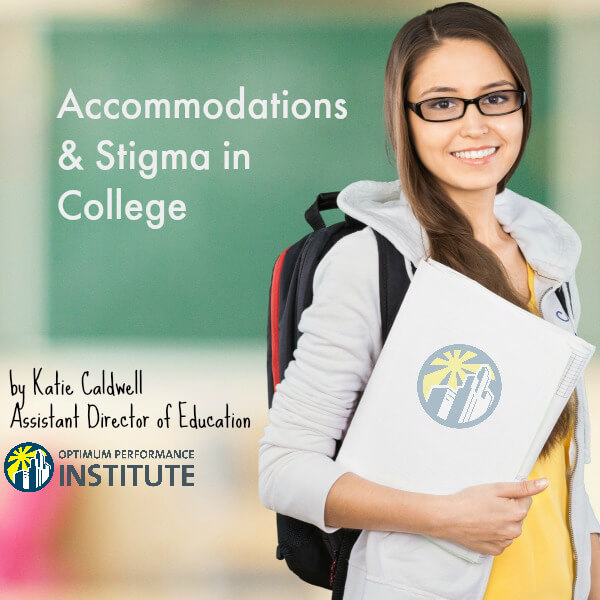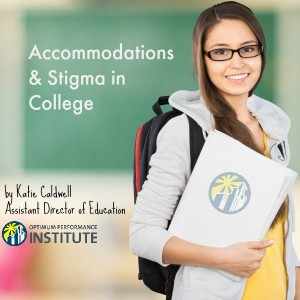
Accommodations and Stigma in College
 “What are accommodations? Do I need them?”
“What are accommodations? Do I need them?”
These are questions frequently asked here at OPI by our young adult participants. Part of helping students transition back into a successful life is educating them on the opportunities available to them. Often they have experienced failures at previous schools, attributing to their depression and sense of hopelessness.
There is good news: There are ways that our participants can find support while in the classroom.
Accommodations are confidential, slight modifications or adaptations to a student’s learning environment that can increase their chances of success. One common misconception is that students need to have learning disabilities to receive help from the school. Though there are accommodations specific to learning disorders, there are also accommodations that help students who suffer from attention issues, anxiety, and depression.
“But then everyone in my class will know I can’t do it on my own.”
There is a stigma around receiving extra support in the classroom that keeps people from using accommodations. It is important to know that accommodations and disability services are confidential. Most college syllabi include a section on gaining services and an invitation for students to discuss their specific needs in a confidential environment. Each student is required to read over the syllabus with the disabilities statement, which helps normalize the process of acquiring accommodations and talking to professors.
“What kind of help can I get? I’m fine in class—except for when I have to take a big test. That’s when I panic.”
There are a variety of accommodations, services, or adaptations that can help students succeed in school. While accommodations are not guaranteed, you can meet with disabilities services to discuss what types of accommodations will bring you the most opportunities for success.
For anxiety or depression, a few accommodations that a student might qualify for include:
- Additional time to complete exams
- Providing a private environment or alternative location to take exams
- Modified deadlines for assignments
- Allowing excused absences
- Allowing a student to work from home
- Providing retroactive withdrawals from courses if academic difficulties were due to depression or other mental health conditions
For ADHD or ADD, students may have access to the following:
- Additional notes from a designated note taker
- Permission to audio record lectures
- Access to slides, presentations, and or outlines from the professor
- Written list of instructions
- Additional time to complete exams
- Providing a private environment or alternative location to take exams
- Additional time or modified deadlines for assignments
- Additional breaks or allowances to leave class
Access to education comes in many forms. Though anxiety, depression, or ADHD may have slowed down a student’s progress in the past, there are many ways to get back on track. Be sure to start the accommodations conversation with your school ahead of time. Here at OPI, we work directly with clinicians to provide appropriate documentation necessary to gain services. Accommodations are just one way students can find success and engage back into their lives.
For more information on OPI’s residential and intensive outpatient (IOP Day Treatment) programs and our measures to help young adults with learning disabilities, accommodations needs, and failure to launch issues, call us at (888)-814-5985 or click HERE to submit an online form. We want to help and will be in touch promptly.
Resources:
